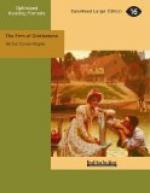Garraway had listened with becoming gravity to the commencement of this speech, but at the last sentence he choked and vanished for the second time out of the room.
“Your friend seems amused,” remarked Dr. Dimsdale mildly.
“Yes. He gets taken like that sometimes,” said his son. “His brothers are just the same. I have hardly had a chance yet to say how glad I am to see you, dad.”
“And I to see you, my dear boy. Your mother and Kate come up by the night train. I have private rooms at the hotel.”
“Kate Harston! I can only remember her as a little quiet girl with long brown hair. That was six years ago. She promised to be pretty.”
“Then she has fulfilled her promise. But you shall judge that for yourself. She is the ward of John Girdlestone, the African merchant, but we are the only relations she has upon earth. Her father was my second cousin. She spends a good deal of her time now with us at Phillimore Gardens—as much as her guardian will allow. He prefers to have her under his own roof, and I don’t blame him, for she is like a ray of sunshine in the house. It was like drawing his teeth to get him to consent to this little holiday, but I stuck at it until I wearied him out—fairly wearied him out.” The little doctor chuckled at the thought of his victory, and stretched out his thick legs towards the fire.
“This examination will prevent me from being with you as much as I wish.”
“That’s right, my boy; let nothing interfere with your work.”
“Still, I think I am pretty safe. I am glad they have come now, for next Wednesday is the international football match. Garraway and I are the two Scotch half-backs. You must all come down and see it.”
“I’ll tell you what, Dimsdale,” said Garraway, reappearing in the doorway, “if we don’t hurry up we shall see nothing of the election. It is close on twelve.”
“I am all ready,” cried Dr. Dimsdale, jumping to his feet and buttoning his coat.
“Let us be off, then,” said his son; and picking up hats and sticks they clattered off down the lodging-house stairs.
A rectorial election is a peculiarly Scotch institution, and, however it may strike the impartial observer, it is regarded by the students themselves as a rite of extreme solemnity and importance from which grave issues may depend. To hear the speeches and addresses of rival orators one would suppose that the integrity of the constitution and the very existence of the empire hung upon the return of their special nominee. Two candidates are chosen from the most eminent of either party and a day is fixed for the polling. Every undergraduate has a vote, but the professors have no voice in the matter. As the duties are nominal and the position honourable, there is never any lack of distinguished aspirants for a vacancy. Occasionally some well-known literary or scientific man is invited to become a candidate, but as a rule the election is fought upon strictly political lines, with all the old-fashioned accompaniments of a Parliamentary contest.




